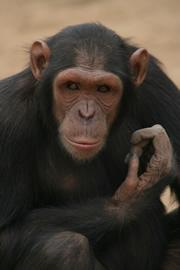From micro to macro - "Lamarcism" ("social learning giving genetical trace-offs") is perhaps more right than wrong...
Nature, 25 June 2007;
Is it a chimp-help-chimp world?Clever experiment shows altruism in great apes.
Kerri SmithHumans are often thought of as the only truly altruistic species. We help others out — by giving blood, donating to the poor, or committing to recycling — for no immediate payoff, and often at a cost to ourselves.
But evidence is gathering that we might not be alone. Felix Warneken and colleagues at the Max Planck Institute for Evolutionary Anthropology in Leipzig, Germany, have shown that chimpanzees will do favours for unrelated chimps - even when they do not get rewarded for it.
Previous studies have refuted the idea that chimps are so giving. In 2005, anthropologist Joan Silk of the University of California, Los Angeles, found that when she presented chimps with the choice of getting food just for themselves, or for their entire group, they showed no preference for feeding their pals as well1.
But other work has shown that chimps can have a non-selfish streak. In a study published in Science last year2, a Leipzig team reported that chimps would help their human keepers retrieve a pen that they had dropped — an action with no direct benefit for the chimp.

That study involved chimps helping out human carers whom they were familiar with — and who had on other occasions provided the chimps with food. To get rid of these complications, the Leipzig team replicated the pen-dropping experiment with unfamiliar humans. As they now report in PLoS Biology3, the chimps still chose to help out.
Let me at that bananaThe team did another experiment too, to clarify whether chimps would be altruistic to others of their own kind without a scent of reward. They placed one chimpanzee in a room with a closed door leading to some bananas that it had seen, and a second chimp in a position where it could not see the bananas, but could open the door. When the first chimp struggled to open the door, the second chimp watching the struggle (but unaware of the reason for it), would pull a chain to open the door. In trials, chimps would help out a struggling mate nearly 80% of the time, even without knowing that food was involved.
Warneken suggests that this clever experimental setup proves what he and others already thought chimps were capable of, but hadn't been able to demonstrate before. "We should move away from the question 'is altruism there?' to the question 'under what circumstances do chimps display this behaviour?'," he says.
Silk says she's impressed with the experiment. "This raises a bunch of questions about the context and the motivation of chimps to behave in a way that is beneficial to others," she says. "What does this mean to them?"
Young and sweetBut Silk notes that the results still might not show true altruism that exists across the species. She wonders, for example, whether there is something special about these chimps and how they have been raised since their capture from the wild. She would like to see the experiment done with other chimps — or for these chimps to have a go at her experiment.
She also wonders whether the age of the chimps makes a difference. Whereas Warneken's group worked with young chimps, Silk's experiments used older animals. Chimps might get more selective in who they help as they age, she suggests.
Warneken is convinced that his experiments offer proof of chimp altruism. And if chimps can do it, the roots of the tendency in our own species might go deeper than previously assumed. "Culture and education are not the only origin of these altruistic tendencies," says Warneken. Human society, he says, has cultivated a trait that was already present, rather than inventing it anew.References
1. Silk J., et al. Nature, 437. 1357 - 1359 (2005). | Article | PubMed | ISI | ChemPort |
2. Warneken F.& Tomasello M. Science, 311. 1301 - 1303 (2006). | Article | PubMed | ChemPort |
3. Warneken F., et al. PLoS Biology, 5. e184 (2007).
http://www.nature.com/news/2007/070625/full/070625-4.html